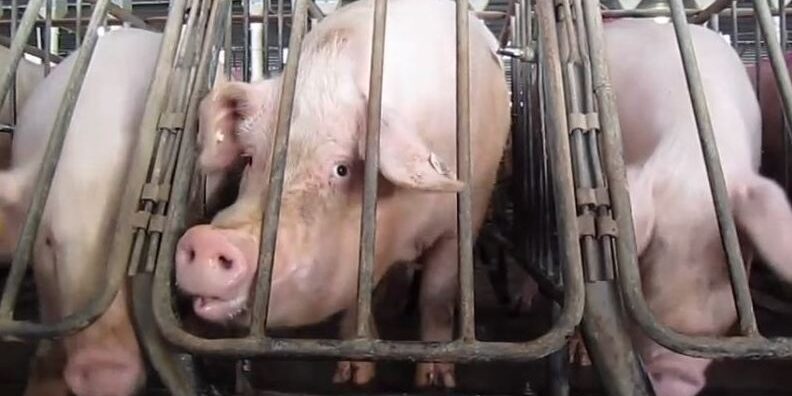For years, images of the horrific suffering of animals trapped in our factory farming system were making their way onto our TV screens.
The secretly-filmed videos were having a powerful and disturbing effect on a public that had simply assumed governments were regulating and monitoring agribusiness to assure basic animal welfare.
One such video, shown on CTV’s W5 in November 2020, captured footage of a very ill pregnant pig being roughly treated as she’s sliced open with a knife and her unborn piglets are ripped out and thrown onto a filthy concrete floor. The viewers then see piglets squealing in pain as, wide awake, they’re castrated and have their tails cut off.
Inside the executive offices of agribusiness and the Doug Ford government, there was only one way to deal with the growing public anger: these videos must be stopped!
So, the Ford government brought in a law, known as an agriculture gag law (or ag-gag) making it illegal, punishable with fines up to $25,000, to get hired at a factory farm or slaughterhouses while concealing an intention to make an undercover video documenting animal abuse.
Interestingly, the farm featured in the pig video shown on W5 pleaded guilty to charges of animal cruelty and was fined $20,000 — a prosecution that would never have happened without the video evidence, which led the farm to plead guilty.
Despite this conviction, demonstrating the value of undercover videos, the government has persisted with its ag-gag law, which has accomplished exactly what the industry wanted: an end to exposés of the miserable lives of animals behind farm factory walls.
Not one such video has been made since the law came into effect almost four years ago, says Camille Labchuk, of the group Animal Justice, which shot the pig video.
However, last April, Animal Justice won an important victory when the Ontario Superior Court struck down key sections of the ag-gag law. Justice Markus Koehnen ruled that parts of the law violated the Charter-protected right to free expression of activists, journalists and whistleblowers.
But the Ford government is appealing the ruling, so the battle continues.
The determination of government and industry to keep the curtain drawn on corporate farming practices suggests that there’s a lot they want to remain hidden.
For instance, they don’t want us to know that baby calves, snatched from their mothers at birth, spend the entire four or five months of their lives confined to narrow crates that prevent them from even turning around. The crates are designed to stunt their muscle growth so that their flesh is tender, when it’s served as veal.
Such heartless practices are not surprising, considering that the powerful, multibillion-dollar corporate farming industry has been allowed to draw up its own codes of conduct and been mostly left to regulate itself behind factory walls.
The replacement of the family farm with industrial farming in recent decades has meant a dramatic worsening of living conditions for millions of animals — who, while different from humans, suffer as we do.
As renowned anthropologist Jane Goodall put it: “Farm animals feel pleasure and sadness, excitement and resentment, depression, fear and pain. They are far more aware and intelligent than we ever imagined.”
What range of emotions must they feel spending their lives as captives inside our wretched factory farming system?
We can get a hint of how much they suffer by watching videos of the lucky few who end up in animal rescue sanctuaries. The joy of these suddenly-released animals as they frolic outdoors for the first time is not something easily forgotten.
Certainly, we live today with a strange disconnect between the world of dogs and cats, who are increasingly loved, spoiled, indulged and treated as part of the family, and the hidden world of suffering farm animals, who typically experience the outdoors for the first time as they’re loaded onto trucks bound for the slaughterhouse.
This article was originally published in the Toronto Star.



